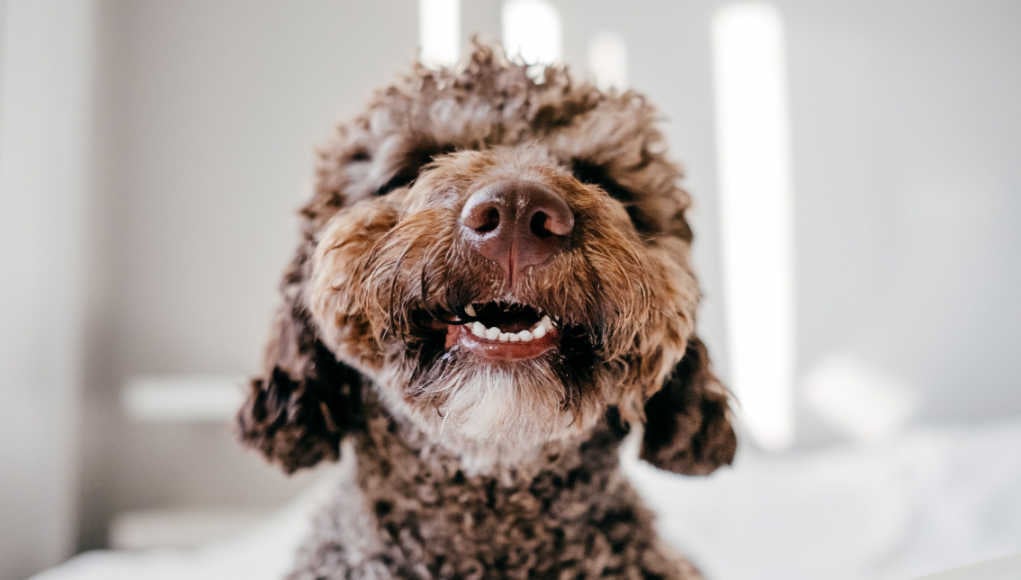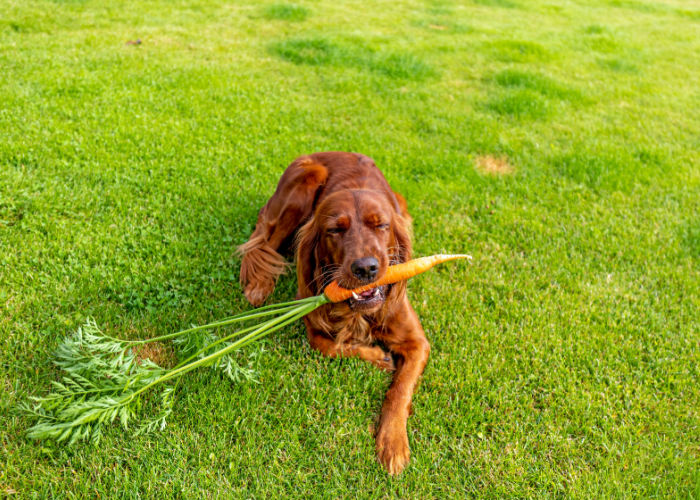Table of Contents
Every pet owner has gotten a face full of stinky dog breath from time to time. We love our pups, but that breath can make you gag! These easy home remedies for bad dog breath are simple and cheap.
You should know that bad breath isn't just an inconvenience – it's a sign of poor dental health. These remedies may get rid of dog breath, but they won't cure the underlying cause.
Along with dental problems, causes of bad breath in dogs include:
- poor digestion
- liver disease
- kidney disease
- oral tumors
For this reason, it's important to have your dog scheduled for yearly vet visits to check his dental health. The doctor will evaluate your pet's dental health, clean his teeth, and look for other causes of bad breath.
It's most likely that your dog's stinky breath is caused by the build-up of bacteria, tartar, and plaque in your dog's mouth. Rotting teeth and gum disease will lead to especially rank breath.
Eww! Dog Breath!
7 Easy Home Remedies
 Bad breath, also called halitosis, is a common problem in dogs. It's not usually something to be concerned about, but it is something that should be treated as soon as possible. Likewise, if the halitosis begins out of nowhere, it's important to consult your veterinarian to look into the underlying cause of the problem.
Bad breath, also called halitosis, is a common problem in dogs. It's not usually something to be concerned about, but it is something that should be treated as soon as possible. Likewise, if the halitosis begins out of nowhere, it's important to consult your veterinarian to look into the underlying cause of the problem.
For minor cases of bad breath in dogs, these home remedies should be able to help the problem. If your dog's breath is especially bad or has been bad for an extended length of time, your best bet would be to schedule a veterinary dental cleaning as soon as possible.
Dental Hygiene
The best remedy for bad dog breath at home is to keep Fido's teeth clean with daily brushing. If you can't fit daily brushing into your schedule, you need to brush your pet's teeth at least three times per week.
We have great articles on canine dental health, and I've made a video guide to teach pet owners how to brush a dog's teeth. Check out these other resources for more information:
- Rotten Teeth in Dogs (and What You Can Do About It)
- 11 Science-Based Dog Teeth Care Tips
- Dog Teeth Cleaning 101: How To Clean A Dog's Teeth
Did you know that poor dental health has been linked to heart disease, kidney disease, and liver disease? The bacteria from your dog's mouth can spread to other body areas through his bloodstream.
Keeping up with your pup's dental health will not only keep his breath smelling fresh but will also prevent other serious health problems from developing down the road.
Clean Water & Food Bowls Regularly
The majority of pet owners do not wash their pet's food and water bowls regularly. In fact, most don't think of washing them at all!
You wash your plates and bowls between uses, right? Why? Because we know that bacteria will grow on the dishes if we don't clean them properly, and we don't want to get sick.
Well, the same can be said for your pet's bowls. Leftover food and drool on bowls provide a breeding ground for bacteria. Stagnant water is also a great place to foster bacteria growth.
Have you ever wiped out your dog's water bowl and found a slimy film on the bottom and sides of the dish? It's called biofilm, and it's a group of bacteria that attach to the surface of the bowl.
This film contains disease-causing bacteria, including Listeria, Salmonella, and E. coli. This bacteria can not only make your pet sick, but it is also a leading cause of bad breath in dogs.
To ensure that your dog's dishes are clean, it's best to wash them daily.
Feed Him Apples and Carrots
Apples and carrots are healthy treats that will add a little nutritional boost to your pup's diet. They also contain vitamins and minerals that help to combat bad breath. Plus, these crunchy snacks will help to scrape plaque and tartar from your pet's teeth as he chews.
Apples contain malic acid, which stimulates saliva production and helps to reduce bad breath. Carrots and apples are both high in fiber, meaning they are great for digestion. Healthy digestion leads to fresher breath.
Apple Cider Vinegar
Apple cider vinegar is a home remedy that everyone should keep in their cupboard. It's beneficial for various issues for both dogs and humans. When it comes to dental health, it helps prevent tooth decay.
Apple cider vinegar is powerful enough to break down plaque and tartar built up on your dog's teeth, and it's easy to use. All you have to do is add 1 teaspoon to a tablespoon (depending on your dog's size) to your pet's water bowl.
Parsley
Parsley is a great ingredient to add to your dog's diet. The herb is rich in Vitamin A, Vitamin C, antioxidants, and folic acid. It can also help freshen your breath.
It would help if you fed parsley in small amounts. Too much of a good thing is not a good thing. Add one teaspoon to 1 tablespoon (depending on your dog's size) of parsley to your dog's meals every 2-3 days.
I recommend fresh parsley, as it will be more effective. But dried parsley is still beneficial if that is all you have. You could also try making these homemade dog treats with parsley.
Pre/Probiotics
A lot of the odor in your dog's mouth comes from his gastrointestinal tract. This odor is caused by the bacteria in the gut that helps to break down food.
Changing the bacteria will help to curb the odor. The easiest way to do this is by feeding your dog probiotics, and prebiotics will help to balance the bacteria in the gut.
They replace the odor-causing bacteria with harmless bacteria that will aid in the digestion of food. This will not only help your pet's breath but also boost his overall health and well-being.
Coconut Oil
One of the most common and affordable dog bad breath home remedies is coconut oil. It reduces and can even prevent bad breath.
Coconut oil tastes great, so your pup shouldn't mind eating it as a treat or a food topper. It is also 100% safe and healthy for your dog to ingest. It has many other benefits for your dog's overall health and well-being.
Coconut oil isn't just good for your pup's breath. It aids in proper digestion and skin and coat health.













